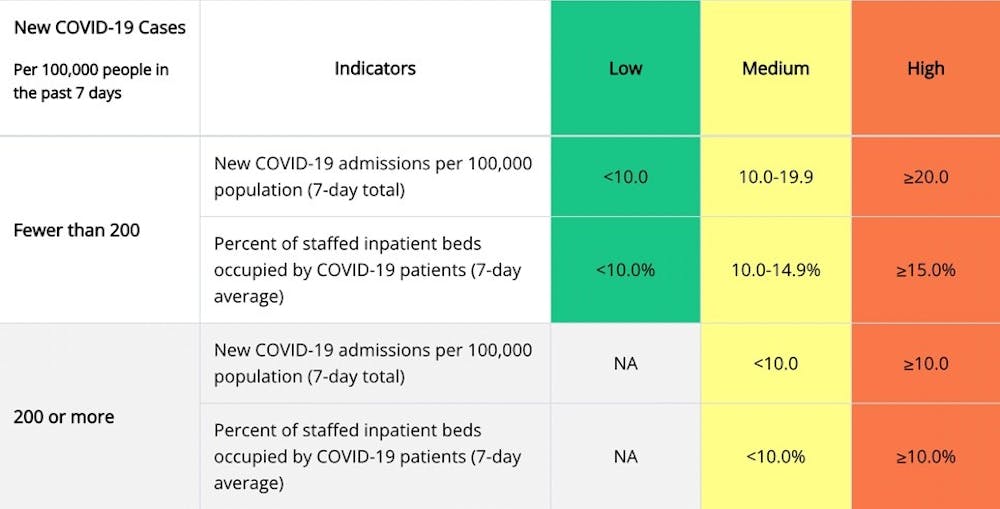University eases COVID-19 policies as Isabella County considered 'low' in infection, spread
President Bob Davies recently announced updates to Central Michigan University’s COVID-19 practices, including ending the requirement to self-report health information and discontinuing on-campus quarantine housing.
“We are updating our COVID-19 practices to better align with the practices of our local health partners, as well as those of many of our peer institutions of higher education,” Davies said in a Jan. 4 email. “These changes also are consistent with state and national trends and the patterns we have seen on campus over the last year."
On-campus vaccines and testing will continue to be offered.
No requirement to self-report
CMU no longer requires students, faculty and staff to report COVID-19 symptoms or positive test results using the health screening app. Instead, for any COVID-related health concerns, the email said to contact a health care provider and visit the Centers for Disease Control and Prevention's (CDC) COVID-19 webpage for information on testing and quarantine.
“With the widespread availability of at-home COVID-19 tests and the challenges of collecting data on new cases, many public health organizations have shifted practice and no longer require individual case reporting or contact tracing,” Davies said in the email. “Please do not come to campus if you are sick or have tested positive for COVID-19.”
Individuals who test positive for COVID-19 should stay home for at least five days. Use the CDC’s isolation and exposure calculator to help you determine how long to isolate.
The email said, as with any other illness, it is your responsibility to notify your instructors and/or supervisor that you are unable to attend class or work.
An end to on-campus quarantine
Based on updated CDC guidelines, CMU will no longer offer quarantine and isolation housing for residential students.
“This step already has been taken by many of CMU’s peer institutions of higher education, and it is consistent with the decline in demand for on-campus isolation housing over the past year,” Davies said in the email.
Students who feel sick should limit non-essential contact with others, follow CDC guidelines and contact their preferred health care provider if symptoms persist or worsen.
Residential students who have questions about this change may contact the Office of Residence Life by calling 989-774-3111.
Vaccines, testing and masks
Primary and bivalent COVID-19 vaccines will continue to be offered at the University Health Services Clinic in Foust Hall. More information about vaccinations and the virus can be found online.
Testing options have become widely available. At-home testing kits are available for online order from covid.gov. Find at-home kits available in stores and in-person testing sites on the State of Michigan’s website.
CMU will continue to offer testing services on-campus for students, faculty and staff. Visit CMU’s COVID-19 testing webpage for more information about clinic hours and test options.
Like in the fall 2022 semester, masks will continue to be optional in all outdoor and most indoor spaces on campus. Some locations, as mandated by state or federal guidelines, will require masks to be worn.
According to the CDC, 46.9% of the total population in Isabella County has received at least one dose of the vaccine and 45.8% have completed the primary series, meaning a series of three monovalent COVID-19 vaccines.
By the numbers
Isabella County has a low COVID-19 community level, according to the CDC’s COVID-19 Data Tracker. Each county is rated low, medium or high.
A low community level occurs when there are less than 10 new COVID-19 admissions for 100,000 people (per seven-day total) and less than 10% of staffed inpatient beds are occupied by COVID-19 patients (per seven-day average).
Since Jan. 4, there have been 35 new cases and less than 10 deaths in Isabella County.
About half of the 68 counties in the lower peninsula of Michigan have a medium COVID-19 community level. The other half, primarily in the northern part of the lower peninsula, have a low community level.
In the upper peninsula, nine out of the 15 counties have a medium community level, leaving five with a low level. Both the upper and lower peninsula have one county each with a high community level.
For more information and resources on COVID-19 in the community, visit the Central Michigan District Health Department.




